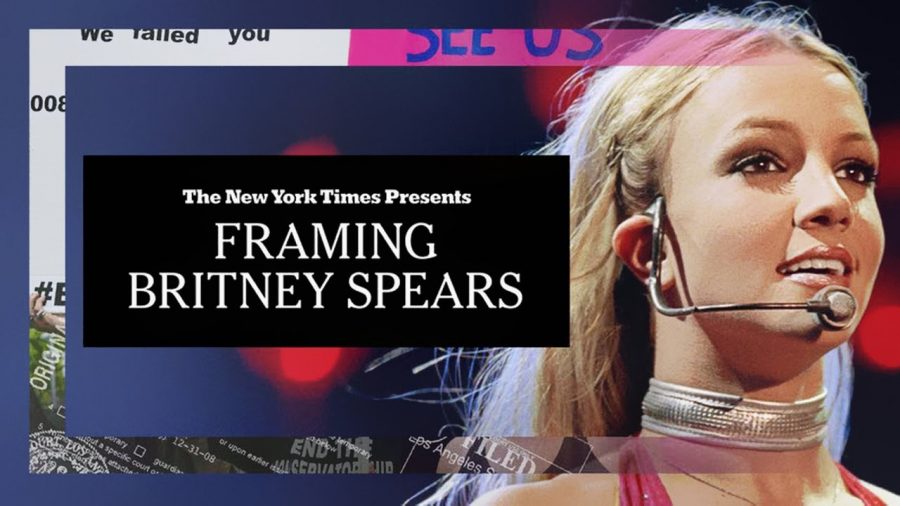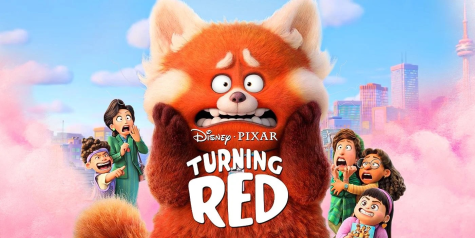“Framing Britney Spears” and the effects of stardom
What everyone can learn from her public struggles
Streaming under FX and Hulu, The New York Times Presents had released on Feb. 5 their documentary, Framing Britney Spears — a one hour and fourteen minute film following the people close to Britney Spears as they discuss her career, downfall and the princess of pop’s life now 13 years in conservatorship.
The project’s opening sequence begins with a #FreeBritney crowd that gathered last year outside the Los Angeles Supreme Court to protest the conservatorship Spears has been under since 2008. In the time that follows, viewers watch Spears’s life as Framing Britney Spears’s director Samantha Stark highlights the theme of control. The film emphasizes such topics such as the superstar’s relationship with sexuality, privacy, mental health and familial relationships.
It is frequently stated throughout the duration of the documentary that before Spears’s conservatorship, she was seen and described as an inspiring woman who was in control of her career and sexuality. Spears showed her fans that a person like her is more than just a pretty face, but rather somone compassionate and sincere — that outside one’s career, a person can be beyond the sex symbol that they are constantly portrayed as. She is a grounded celebrity despite her on-camera persona, but as the film mentions, this contradiction was difficult for the people in the 1990s and 2000s to understand. Instead, they preferred to focus on the negative aspects of her image, the first great instance of this being her breakup with the singer, Justin Timberlake.
The story that took hold in 2002 is undoubtedly revolved around misogyny, painting Spears, as the documentary puts it, as the “school sl*t” and is to be blamed for the heartbreak of America’s sweetheart. The twisted narrative of her setting a “bad” example for the minors of that generation continues for many female artists today such as Rihanna, Nicki Minaj and Megan Thee Stallion who confidently express and embrace their femininity. Much of the media remains in a hypocritical, double-standard mentality where people are given permission to scrutinize (female) artists such as them while still constantly asking and prying about their virginity, breasts and personal relationships.
The attacks on Spears’s sexuality, in particular, led to the downfall of her mental health, which the media unrelentlessly attacked as well. Most who know of the superstar’s story know the memes of her “questionable” actions as a mother, her substance abuse and her bald head and the notorious umbrella. It was a story that most of society had believed and accepted, but as Stark shows, it is not the whole truth.
The conversation revolving around mental health is relatively new, a subject seen as extraordinarily taboo as it easier to deem one crazy and incapable of help instead of directly addressing the root of one’s issues. For Spears, the deterioration of her mental health had stemmed from the relentless paparazzi that showed her off as an “unfit” mother and an “unstable” person as they stubbornly denied Spears’s requests to give her a break. Like a test subject to observe and experiment, people around the world watched as she fell from grace. The invasion of Spears’s privacy and the refusal to listen to her pleas led to one of the most infamous events in 2007 — the cutting of her blonde locks.
Baldness, as the audience watches, had been the breaking point. The representation of Spears wanting the media to back away for good, to leave her alone until she is able to reconstruct her health and guise. Instead, the opposite occurred and further fueled the fire. Everyone other than Spears had benefited from the experience as money was lent in exchange for her suffering. Her ex-boyfriend, Justin Timberlake, had built and sold out his solo career and publicity around their breakup, the paparazzi inappropriately built a fortune of her unsanctioned candids and very soon, her father Jaime Spears.
Conservatorships, like Spears’s, is an issue that sparks many debates over the integrity and ethics of the institution. It is defined as a legal concept in the United States that a guardian or a protector is appointed by a judge to manage the financial affairs and/or daily life of another due to physical or mental limitations or old age. According to CBS News, many courts grant conservatorships as a “first resort” when someone encounters difficulties or experiences age-related disabilities with no means of getting out. In the case of Spears, when she entered her conservatorship, she had lost every sense of control she had over her life as she was largely put under the strict supervision of a man that had been given the perfect opportunity to capitalize on his daughter’s success.
Many hold the idea that Spears’s father is hardly fit to control her life and many others believe that Spears should not be in a conservatorship at all. From an ethical standpoint, Spears was willing to comply being put in a conservatorship so long as her father was not in charge of her career, estate and finances, as Spears has expressed her disdain and fear towards her father. The stance is understandably justified as during her upbringings, he was known to lack a sense of empathy and with an added history of being a substance abuser, failed businessman and an inconsistent figure in her life it is to the surprise of no one that Spears would seek such actions. From a legal standpoint, it can be seen that B. Spears is a “high-functioning conservatee” that is capable of handling her business as seen from the release of four albums and numerous tours and performances while living under her conservatorship. These factors in turn make for a decently strong case as many #FreeBritney advocates point out.
“Britney herself is vehemently opposed to this effort by her father to keep her legal struggle hidden away in the closet as a family secret,” her court-appointed lawyer said in recent court documents. “In this case, it is not an exaggeration to say that the whole world is watching.”
In these past years, Spears has lacked a voice, say and power to her name. The identity that she created has been tarnished by those who have told her who she is or who she is told to be. The largely unsympathetic treatment that lashed out and stuck to her, in the opinions of some, would not have been as extreme had she been a man, alluding to the idea that Spears had been an artist ahead of her male-driven, misogynistic time. The consequences now withhold her from living a normal life and the only means of connecting with her fans is through Spears’s Instagram posts as they analyze the crypticness of her emoji use for hours.
“If I wasn’t under the restraints that I’m under right now […] I’d feel so liberated and feel like myself,” Britney said to an interviewer about the limits to her personal freedom in a clip the Times series played from the MTV documentary Britney: For The Record. “I’m kind of stuck in this place, and it’s like, how do you deal? I just cope with it every day. When I tell them the way I feel, it’s like they hear me but they’re really not listening. They’re hearing what they want to hear. They’re not listening to what I’m telling them. It’s bad… I’m sad.”
There is something to learn in Framing Britney Spears which Stark has illustrated in a beautiful and empowering way — that we all have the right to live our lives in the way we want, and receiving mental help should feel liberating rather than cornering.
Since her public debut in 1992, Spears has been under endless watch. The American people watched her grow and fall. We all believed we knew her narrative, but we did not. We still do not and we will not know until she is able to leave her conservatorship and speak long-awaited truths.
For now, all we know is this — Britney Jean Spears is the princess of pop, a creative artist and a celebrity. But she is also a daughter of a man that had been an inconsistent presence in her life, a divorcee twice over, a mother of two children whom she is rarely able to see and a woman who was consumed by the media during the beginnings of her life and has suffered because of it.
“That’s why I am where I am today is because I do have control,” Spears said in an interview previous to her conservatorship. “And you just control what you do. You know you have to. Otherwise, you get sucked in by people that are not necessary.”
#FreeBritney is more than a struggle set by overzealous stans and avid conspirators to set a star from the 2000s free from her conservatorship, but rather the advocacy of the various problems and abuses that lie within the system of conservatorship. Simply put, Spears is a conservatorship victim standing at the forefront of social development, the catalyst to bring changes to the many others trapped just like her.









